PROJ6016 - Project Management Capstone Reflective Report Analysis
VerifiedAdded on 2023/03/21
|10
|2520
|95
Report
AI Summary
This reflective report provides a comprehensive overview of a project management capstone, focusing on the application of project management theories and practices within a real-world context. The report details the lessons learned throughout the course, emphasizing the role of bridging theory in successfully implementing projects within budget and timeframe constraints. It highlights the importance of analyzing project type, size, and complexity before selecting appropriate project management approaches. The report explores the application of bridging theories and practices in creating linkages between employee skills and business expectations, including the preparation of managerial documents. The author integrates and synthesizes complex information from the project, demonstrating the application of project management knowledge areas such as communication, resource, risk, schedule, cost, time, scope, and quality management. The author reflects on the benefits gained from the course, including the ability to apply knowledge to real-world projects, mitigate risks, and improve communication. The report concludes by emphasizing the importance of using various project management methodologies and approaches for ultimate project success.
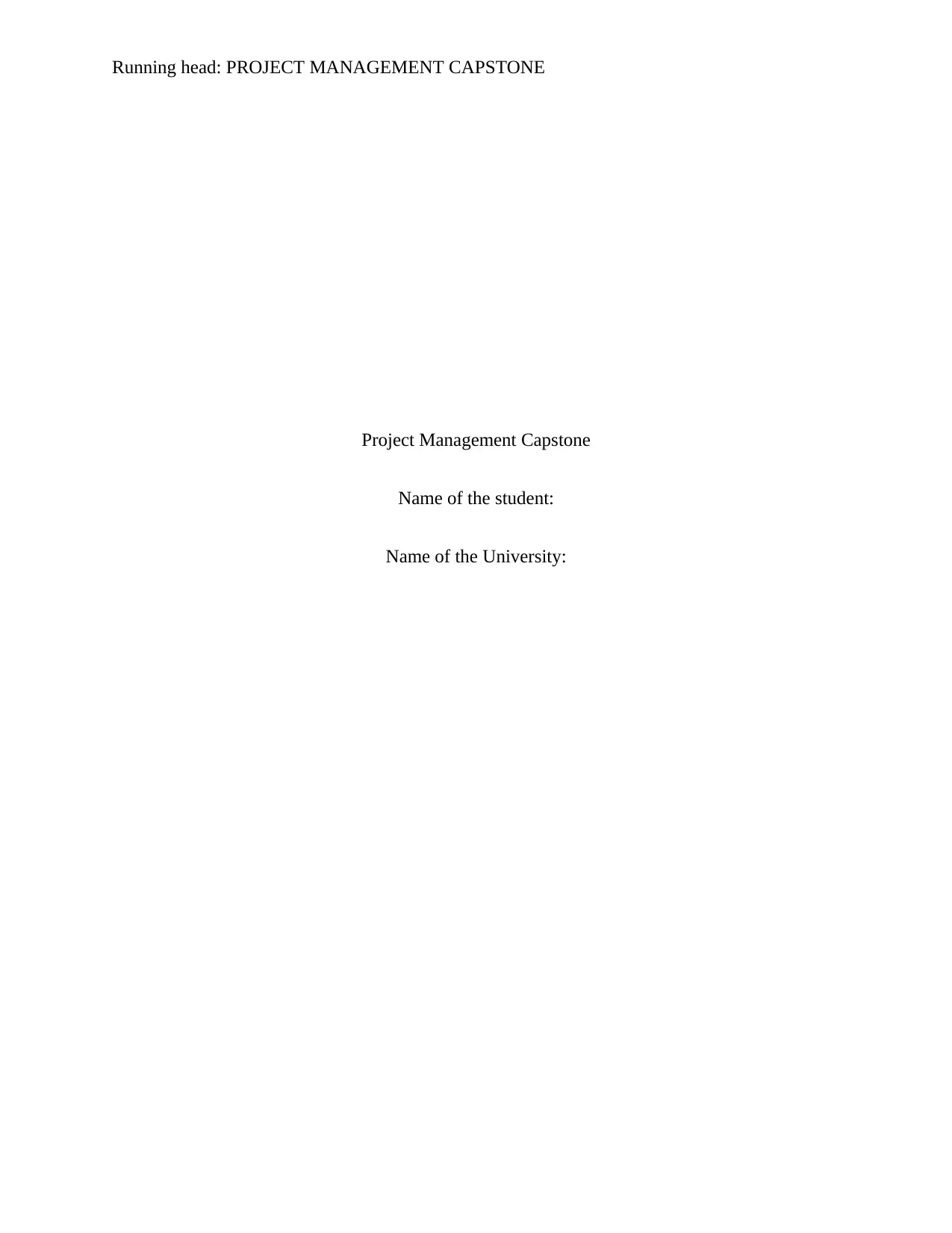
Running head: PROJECT MANAGEMENT CAPSTONE
Project Management Capstone
Name of the student:
Name of the University:
Project Management Capstone
Name of the student:
Name of the University:
Paraphrase This Document
Need a fresh take? Get an instant paraphrase of this document with our AI Paraphraser
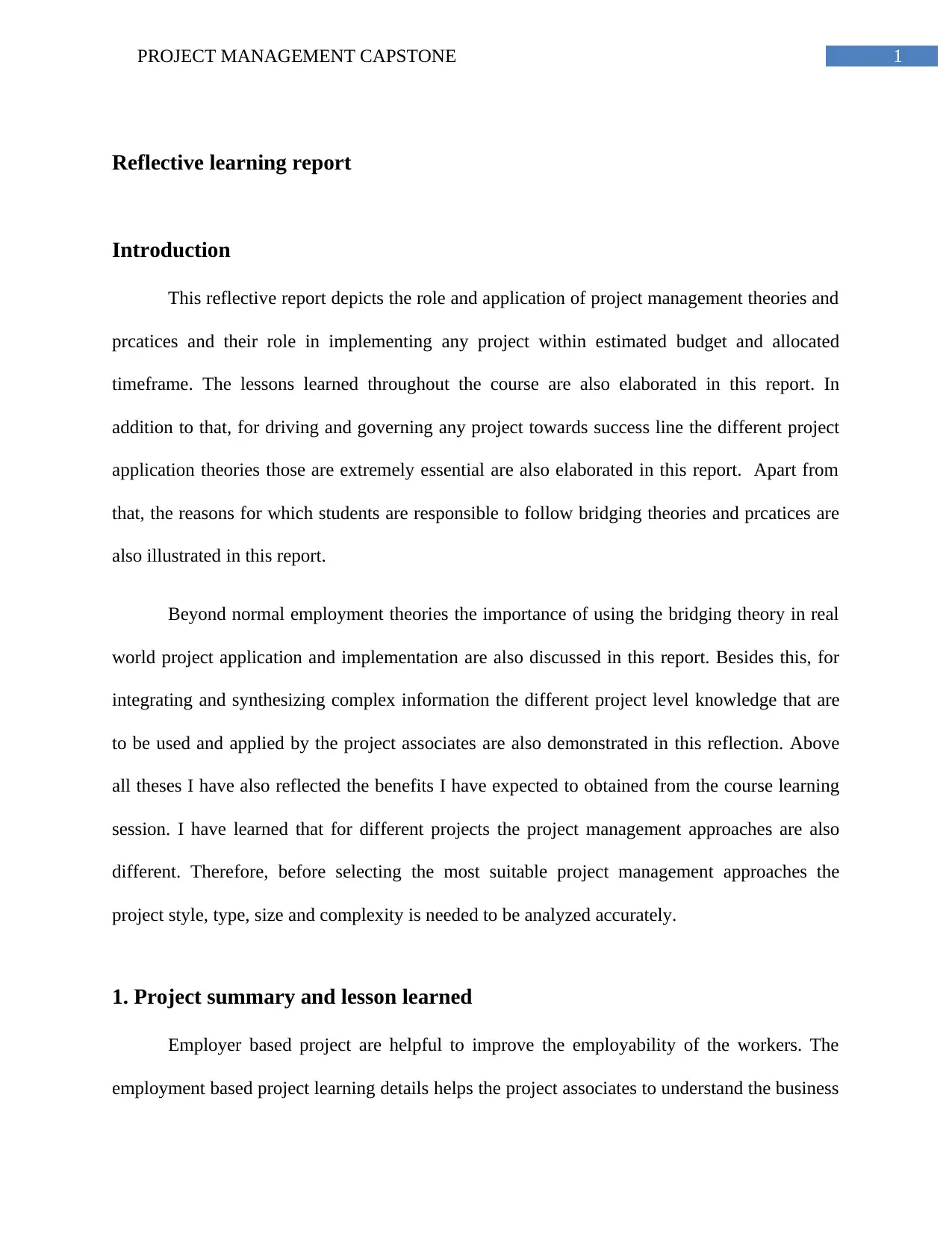
1PROJECT MANAGEMENT CAPSTONE
Reflective learning report
Introduction
This reflective report depicts the role and application of project management theories and
prcatices and their role in implementing any project within estimated budget and allocated
timeframe. The lessons learned throughout the course are also elaborated in this report. In
addition to that, for driving and governing any project towards success line the different project
application theories those are extremely essential are also elaborated in this report. Apart from
that, the reasons for which students are responsible to follow bridging theories and prcatices are
also illustrated in this report.
Beyond normal employment theories the importance of using the bridging theory in real
world project application and implementation are also discussed in this report. Besides this, for
integrating and synthesizing complex information the different project level knowledge that are
to be used and applied by the project associates are also demonstrated in this reflection. Above
all theses I have also reflected the benefits I have expected to obtained from the course learning
session. I have learned that for different projects the project management approaches are also
different. Therefore, before selecting the most suitable project management approaches the
project style, type, size and complexity is needed to be analyzed accurately.
1. Project summary and lesson learned
Employer based project are helpful to improve the employability of the workers. The
employment based project learning details helps the project associates to understand the business
Reflective learning report
Introduction
This reflective report depicts the role and application of project management theories and
prcatices and their role in implementing any project within estimated budget and allocated
timeframe. The lessons learned throughout the course are also elaborated in this report. In
addition to that, for driving and governing any project towards success line the different project
application theories those are extremely essential are also elaborated in this report. Apart from
that, the reasons for which students are responsible to follow bridging theories and prcatices are
also illustrated in this report.
Beyond normal employment theories the importance of using the bridging theory in real
world project application and implementation are also discussed in this report. Besides this, for
integrating and synthesizing complex information the different project level knowledge that are
to be used and applied by the project associates are also demonstrated in this reflection. Above
all theses I have also reflected the benefits I have expected to obtained from the course learning
session. I have learned that for different projects the project management approaches are also
different. Therefore, before selecting the most suitable project management approaches the
project style, type, size and complexity is needed to be analyzed accurately.
1. Project summary and lesson learned
Employer based project are helpful to improve the employability of the workers. The
employment based project learning details helps the project associates to understand the business
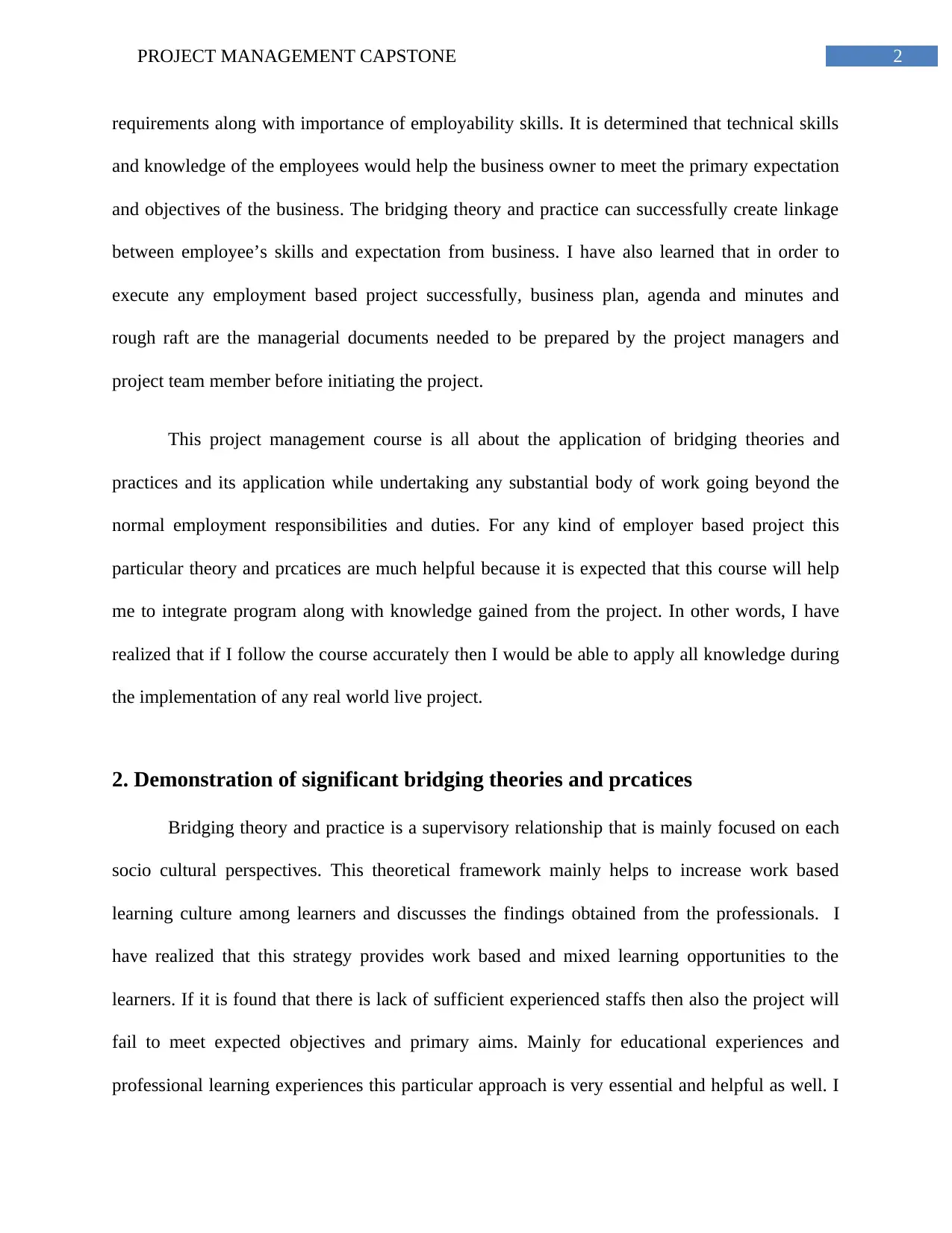
2PROJECT MANAGEMENT CAPSTONE
requirements along with importance of employability skills. It is determined that technical skills
and knowledge of the employees would help the business owner to meet the primary expectation
and objectives of the business. The bridging theory and practice can successfully create linkage
between employee’s skills and expectation from business. I have also learned that in order to
execute any employment based project successfully, business plan, agenda and minutes and
rough raft are the managerial documents needed to be prepared by the project managers and
project team member before initiating the project.
This project management course is all about the application of bridging theories and
practices and its application while undertaking any substantial body of work going beyond the
normal employment responsibilities and duties. For any kind of employer based project this
particular theory and prcatices are much helpful because it is expected that this course will help
me to integrate program along with knowledge gained from the project. In other words, I have
realized that if I follow the course accurately then I would be able to apply all knowledge during
the implementation of any real world live project.
2. Demonstration of significant bridging theories and prcatices
Bridging theory and practice is a supervisory relationship that is mainly focused on each
socio cultural perspectives. This theoretical framework mainly helps to increase work based
learning culture among learners and discusses the findings obtained from the professionals. I
have realized that this strategy provides work based and mixed learning opportunities to the
learners. If it is found that there is lack of sufficient experienced staffs then also the project will
fail to meet expected objectives and primary aims. Mainly for educational experiences and
professional learning experiences this particular approach is very essential and helpful as well. I
requirements along with importance of employability skills. It is determined that technical skills
and knowledge of the employees would help the business owner to meet the primary expectation
and objectives of the business. The bridging theory and practice can successfully create linkage
between employee’s skills and expectation from business. I have also learned that in order to
execute any employment based project successfully, business plan, agenda and minutes and
rough raft are the managerial documents needed to be prepared by the project managers and
project team member before initiating the project.
This project management course is all about the application of bridging theories and
practices and its application while undertaking any substantial body of work going beyond the
normal employment responsibilities and duties. For any kind of employer based project this
particular theory and prcatices are much helpful because it is expected that this course will help
me to integrate program along with knowledge gained from the project. In other words, I have
realized that if I follow the course accurately then I would be able to apply all knowledge during
the implementation of any real world live project.
2. Demonstration of significant bridging theories and prcatices
Bridging theory and practice is a supervisory relationship that is mainly focused on each
socio cultural perspectives. This theoretical framework mainly helps to increase work based
learning culture among learners and discusses the findings obtained from the professionals. I
have realized that this strategy provides work based and mixed learning opportunities to the
learners. If it is found that there is lack of sufficient experienced staffs then also the project will
fail to meet expected objectives and primary aims. Mainly for educational experiences and
professional learning experiences this particular approach is very essential and helpful as well. I
⊘ This is a preview!⊘
Do you want full access?
Subscribe today to unlock all pages.

Trusted by 1+ million students worldwide
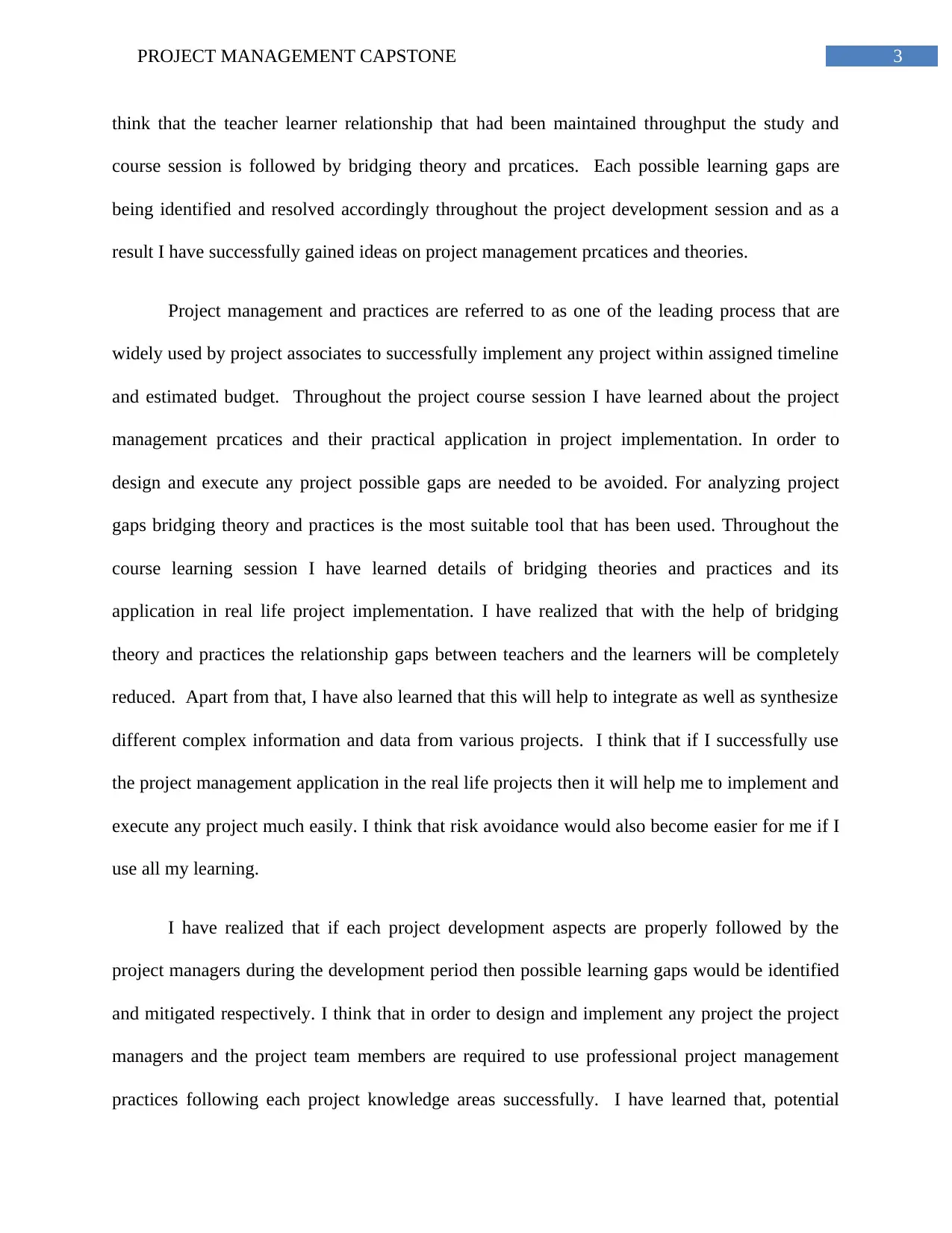
3PROJECT MANAGEMENT CAPSTONE
think that the teacher learner relationship that had been maintained throughput the study and
course session is followed by bridging theory and prcatices. Each possible learning gaps are
being identified and resolved accordingly throughout the project development session and as a
result I have successfully gained ideas on project management prcatices and theories.
Project management and practices are referred to as one of the leading process that are
widely used by project associates to successfully implement any project within assigned timeline
and estimated budget. Throughout the project course session I have learned about the project
management prcatices and their practical application in project implementation. In order to
design and execute any project possible gaps are needed to be avoided. For analyzing project
gaps bridging theory and practices is the most suitable tool that has been used. Throughout the
course learning session I have learned details of bridging theories and practices and its
application in real life project implementation. I have realized that with the help of bridging
theory and practices the relationship gaps between teachers and the learners will be completely
reduced. Apart from that, I have also learned that this will help to integrate as well as synthesize
different complex information and data from various projects. I think that if I successfully use
the project management application in the real life projects then it will help me to implement and
execute any project much easily. I think that risk avoidance would also become easier for me if I
use all my learning.
I have realized that if each project development aspects are properly followed by the
project managers during the development period then possible learning gaps would be identified
and mitigated respectively. I think that in order to design and implement any project the project
managers and the project team members are required to use professional project management
practices following each project knowledge areas successfully. I have learned that, potential
think that the teacher learner relationship that had been maintained throughput the study and
course session is followed by bridging theory and prcatices. Each possible learning gaps are
being identified and resolved accordingly throughout the project development session and as a
result I have successfully gained ideas on project management prcatices and theories.
Project management and practices are referred to as one of the leading process that are
widely used by project associates to successfully implement any project within assigned timeline
and estimated budget. Throughout the project course session I have learned about the project
management prcatices and their practical application in project implementation. In order to
design and execute any project possible gaps are needed to be avoided. For analyzing project
gaps bridging theory and practices is the most suitable tool that has been used. Throughout the
course learning session I have learned details of bridging theories and practices and its
application in real life project implementation. I have realized that with the help of bridging
theory and practices the relationship gaps between teachers and the learners will be completely
reduced. Apart from that, I have also learned that this will help to integrate as well as synthesize
different complex information and data from various projects. I think that if I successfully use
the project management application in the real life projects then it will help me to implement and
execute any project much easily. I think that risk avoidance would also become easier for me if I
use all my learning.
I have realized that if each project development aspects are properly followed by the
project managers during the development period then possible learning gaps would be identified
and mitigated respectively. I think that in order to design and implement any project the project
managers and the project team members are required to use professional project management
practices following each project knowledge areas successfully. I have learned that, potential
Paraphrase This Document
Need a fresh take? Get an instant paraphrase of this document with our AI Paraphraser
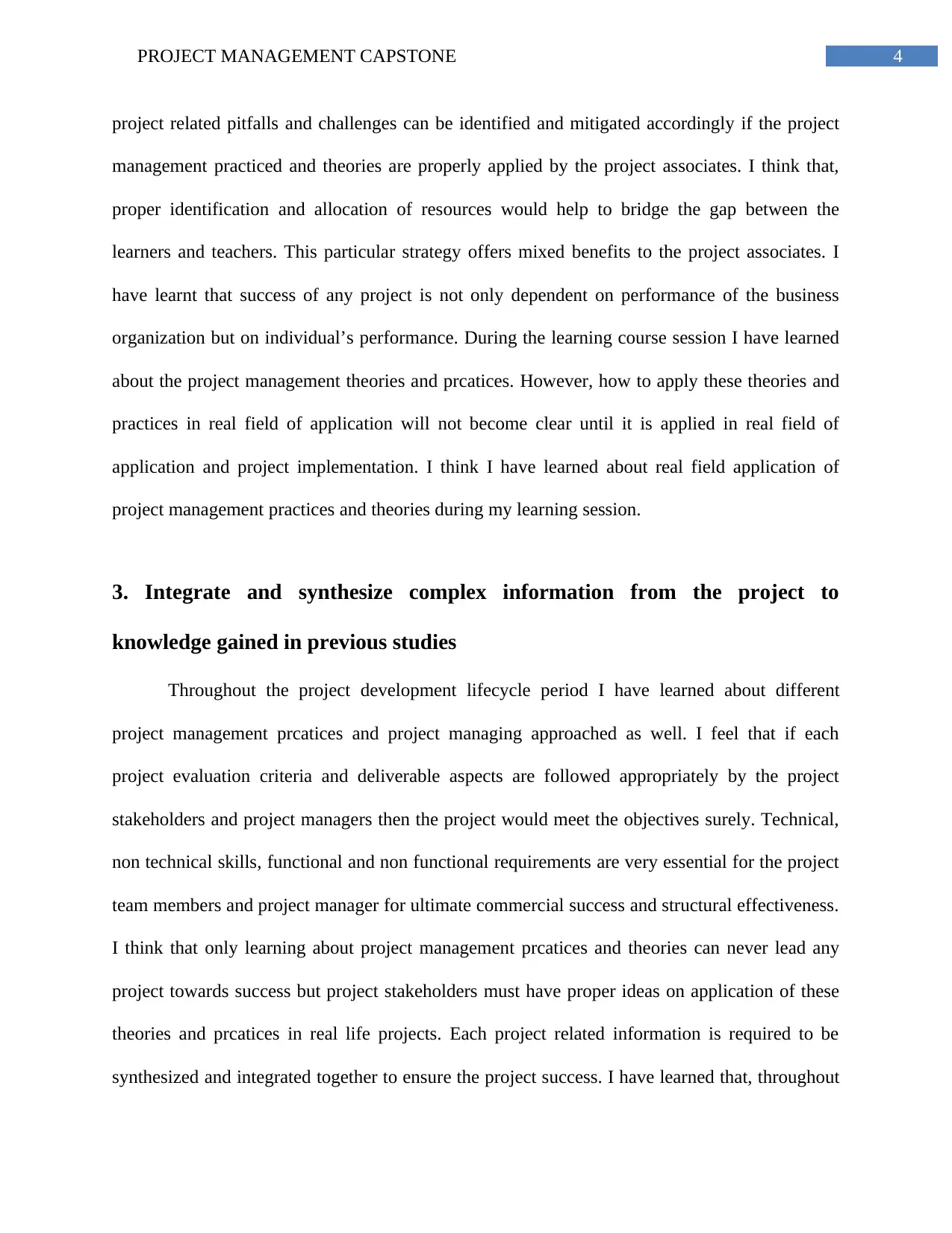
4PROJECT MANAGEMENT CAPSTONE
project related pitfalls and challenges can be identified and mitigated accordingly if the project
management practiced and theories are properly applied by the project associates. I think that,
proper identification and allocation of resources would help to bridge the gap between the
learners and teachers. This particular strategy offers mixed benefits to the project associates. I
have learnt that success of any project is not only dependent on performance of the business
organization but on individual’s performance. During the learning course session I have learned
about the project management theories and prcatices. However, how to apply these theories and
practices in real field of application will not become clear until it is applied in real field of
application and project implementation. I think I have learned about real field application of
project management practices and theories during my learning session.
3. Integrate and synthesize complex information from the project to
knowledge gained in previous studies
Throughout the project development lifecycle period I have learned about different
project management prcatices and project managing approached as well. I feel that if each
project evaluation criteria and deliverable aspects are followed appropriately by the project
stakeholders and project managers then the project would meet the objectives surely. Technical,
non technical skills, functional and non functional requirements are very essential for the project
team members and project manager for ultimate commercial success and structural effectiveness.
I think that only learning about project management prcatices and theories can never lead any
project towards success but project stakeholders must have proper ideas on application of these
theories and prcatices in real life projects. Each project related information is required to be
synthesized and integrated together to ensure the project success. I have learned that, throughout
project related pitfalls and challenges can be identified and mitigated accordingly if the project
management practiced and theories are properly applied by the project associates. I think that,
proper identification and allocation of resources would help to bridge the gap between the
learners and teachers. This particular strategy offers mixed benefits to the project associates. I
have learnt that success of any project is not only dependent on performance of the business
organization but on individual’s performance. During the learning course session I have learned
about the project management theories and prcatices. However, how to apply these theories and
practices in real field of application will not become clear until it is applied in real field of
application and project implementation. I think I have learned about real field application of
project management practices and theories during my learning session.
3. Integrate and synthesize complex information from the project to
knowledge gained in previous studies
Throughout the project development lifecycle period I have learned about different
project management prcatices and project managing approached as well. I feel that if each
project evaluation criteria and deliverable aspects are followed appropriately by the project
stakeholders and project managers then the project would meet the objectives surely. Technical,
non technical skills, functional and non functional requirements are very essential for the project
team members and project manager for ultimate commercial success and structural effectiveness.
I think that only learning about project management prcatices and theories can never lead any
project towards success but project stakeholders must have proper ideas on application of these
theories and prcatices in real life projects. Each project related information is required to be
synthesized and integrated together to ensure the project success. I have learned that, throughout
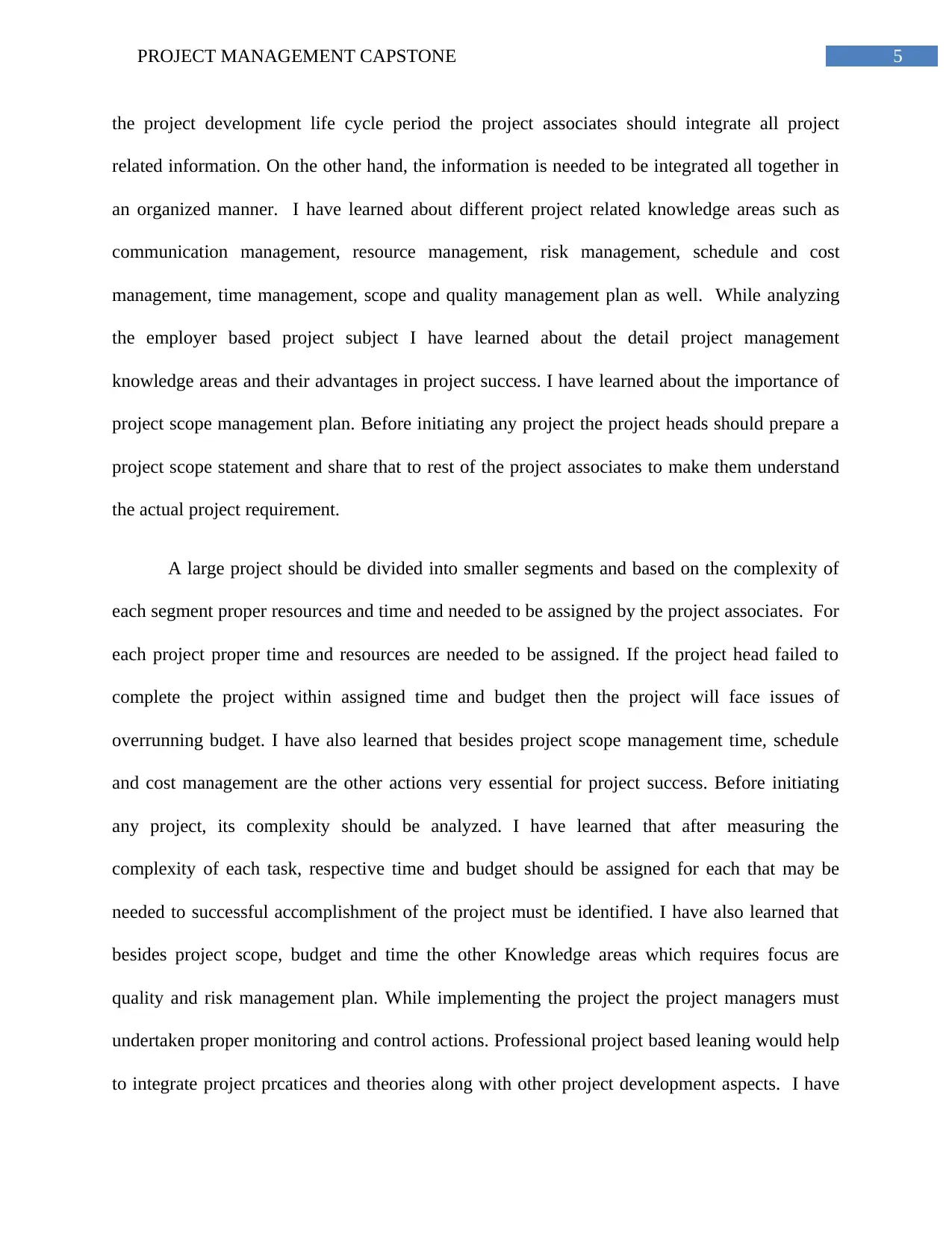
5PROJECT MANAGEMENT CAPSTONE
the project development life cycle period the project associates should integrate all project
related information. On the other hand, the information is needed to be integrated all together in
an organized manner. I have learned about different project related knowledge areas such as
communication management, resource management, risk management, schedule and cost
management, time management, scope and quality management plan as well. While analyzing
the employer based project subject I have learned about the detail project management
knowledge areas and their advantages in project success. I have learned about the importance of
project scope management plan. Before initiating any project the project heads should prepare a
project scope statement and share that to rest of the project associates to make them understand
the actual project requirement.
A large project should be divided into smaller segments and based on the complexity of
each segment proper resources and time and needed to be assigned by the project associates. For
each project proper time and resources are needed to be assigned. If the project head failed to
complete the project within assigned time and budget then the project will face issues of
overrunning budget. I have also learned that besides project scope management time, schedule
and cost management are the other actions very essential for project success. Before initiating
any project, its complexity should be analyzed. I have learned that after measuring the
complexity of each task, respective time and budget should be assigned for each that may be
needed to successful accomplishment of the project must be identified. I have also learned that
besides project scope, budget and time the other Knowledge areas which requires focus are
quality and risk management plan. While implementing the project the project managers must
undertaken proper monitoring and control actions. Professional project based leaning would help
to integrate project prcatices and theories along with other project development aspects. I have
the project development life cycle period the project associates should integrate all project
related information. On the other hand, the information is needed to be integrated all together in
an organized manner. I have learned about different project related knowledge areas such as
communication management, resource management, risk management, schedule and cost
management, time management, scope and quality management plan as well. While analyzing
the employer based project subject I have learned about the detail project management
knowledge areas and their advantages in project success. I have learned about the importance of
project scope management plan. Before initiating any project the project heads should prepare a
project scope statement and share that to rest of the project associates to make them understand
the actual project requirement.
A large project should be divided into smaller segments and based on the complexity of
each segment proper resources and time and needed to be assigned by the project associates. For
each project proper time and resources are needed to be assigned. If the project head failed to
complete the project within assigned time and budget then the project will face issues of
overrunning budget. I have also learned that besides project scope management time, schedule
and cost management are the other actions very essential for project success. Before initiating
any project, its complexity should be analyzed. I have learned that after measuring the
complexity of each task, respective time and budget should be assigned for each that may be
needed to successful accomplishment of the project must be identified. I have also learned that
besides project scope, budget and time the other Knowledge areas which requires focus are
quality and risk management plan. While implementing the project the project managers must
undertaken proper monitoring and control actions. Professional project based leaning would help
to integrate project prcatices and theories along with other project development aspects. I have
⊘ This is a preview!⊘
Do you want full access?
Subscribe today to unlock all pages.

Trusted by 1+ million students worldwide
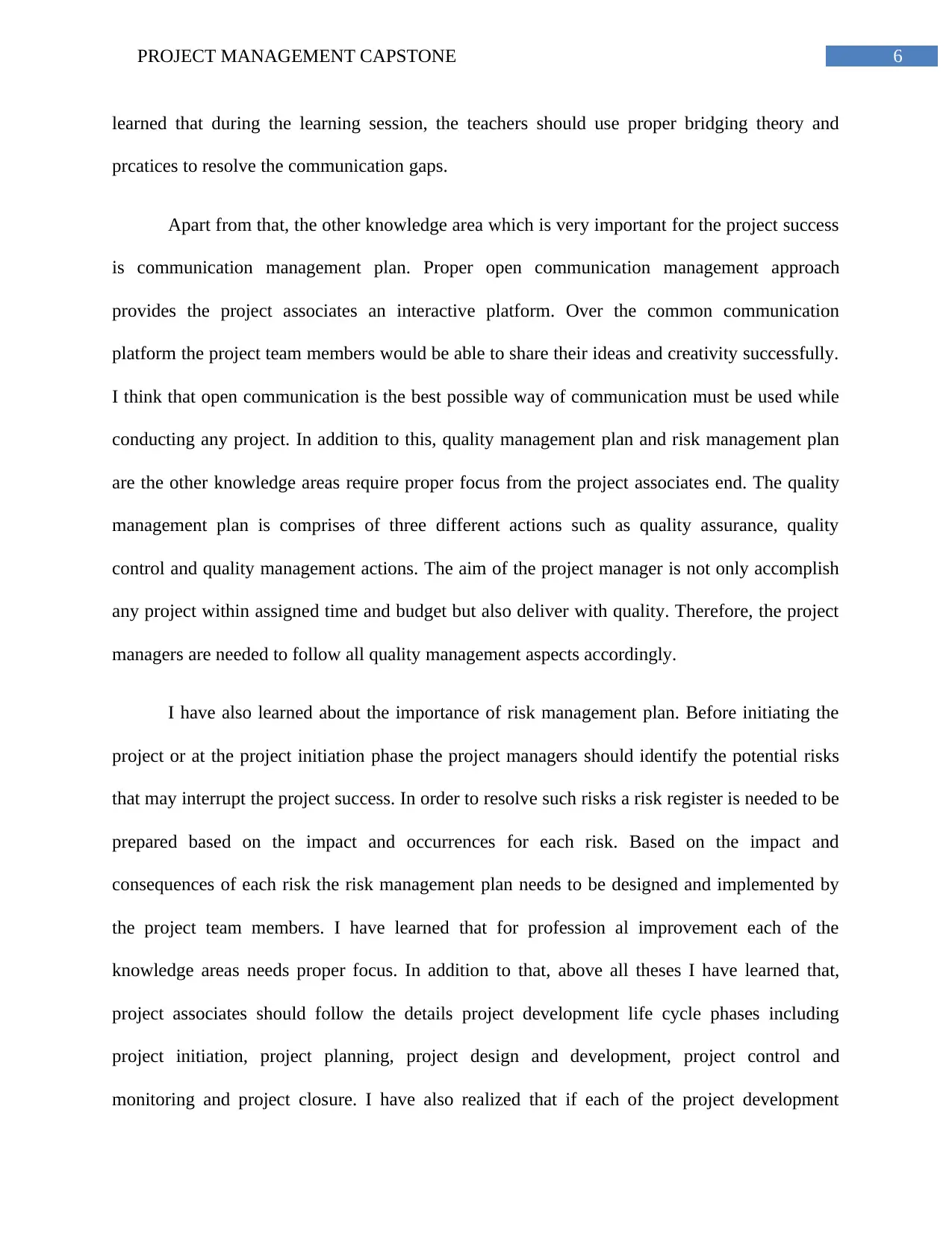
6PROJECT MANAGEMENT CAPSTONE
learned that during the learning session, the teachers should use proper bridging theory and
prcatices to resolve the communication gaps.
Apart from that, the other knowledge area which is very important for the project success
is communication management plan. Proper open communication management approach
provides the project associates an interactive platform. Over the common communication
platform the project team members would be able to share their ideas and creativity successfully.
I think that open communication is the best possible way of communication must be used while
conducting any project. In addition to this, quality management plan and risk management plan
are the other knowledge areas require proper focus from the project associates end. The quality
management plan is comprises of three different actions such as quality assurance, quality
control and quality management actions. The aim of the project manager is not only accomplish
any project within assigned time and budget but also deliver with quality. Therefore, the project
managers are needed to follow all quality management aspects accordingly.
I have also learned about the importance of risk management plan. Before initiating the
project or at the project initiation phase the project managers should identify the potential risks
that may interrupt the project success. In order to resolve such risks a risk register is needed to be
prepared based on the impact and occurrences for each risk. Based on the impact and
consequences of each risk the risk management plan needs to be designed and implemented by
the project team members. I have learned that for profession al improvement each of the
knowledge areas needs proper focus. In addition to that, above all theses I have learned that,
project associates should follow the details project development life cycle phases including
project initiation, project planning, project design and development, project control and
monitoring and project closure. I have also realized that if each of the project development
learned that during the learning session, the teachers should use proper bridging theory and
prcatices to resolve the communication gaps.
Apart from that, the other knowledge area which is very important for the project success
is communication management plan. Proper open communication management approach
provides the project associates an interactive platform. Over the common communication
platform the project team members would be able to share their ideas and creativity successfully.
I think that open communication is the best possible way of communication must be used while
conducting any project. In addition to this, quality management plan and risk management plan
are the other knowledge areas require proper focus from the project associates end. The quality
management plan is comprises of three different actions such as quality assurance, quality
control and quality management actions. The aim of the project manager is not only accomplish
any project within assigned time and budget but also deliver with quality. Therefore, the project
managers are needed to follow all quality management aspects accordingly.
I have also learned about the importance of risk management plan. Before initiating the
project or at the project initiation phase the project managers should identify the potential risks
that may interrupt the project success. In order to resolve such risks a risk register is needed to be
prepared based on the impact and occurrences for each risk. Based on the impact and
consequences of each risk the risk management plan needs to be designed and implemented by
the project team members. I have learned that for profession al improvement each of the
knowledge areas needs proper focus. In addition to that, above all theses I have learned that,
project associates should follow the details project development life cycle phases including
project initiation, project planning, project design and development, project control and
monitoring and project closure. I have also realized that if each of the project development
Paraphrase This Document
Need a fresh take? Get an instant paraphrase of this document with our AI Paraphraser
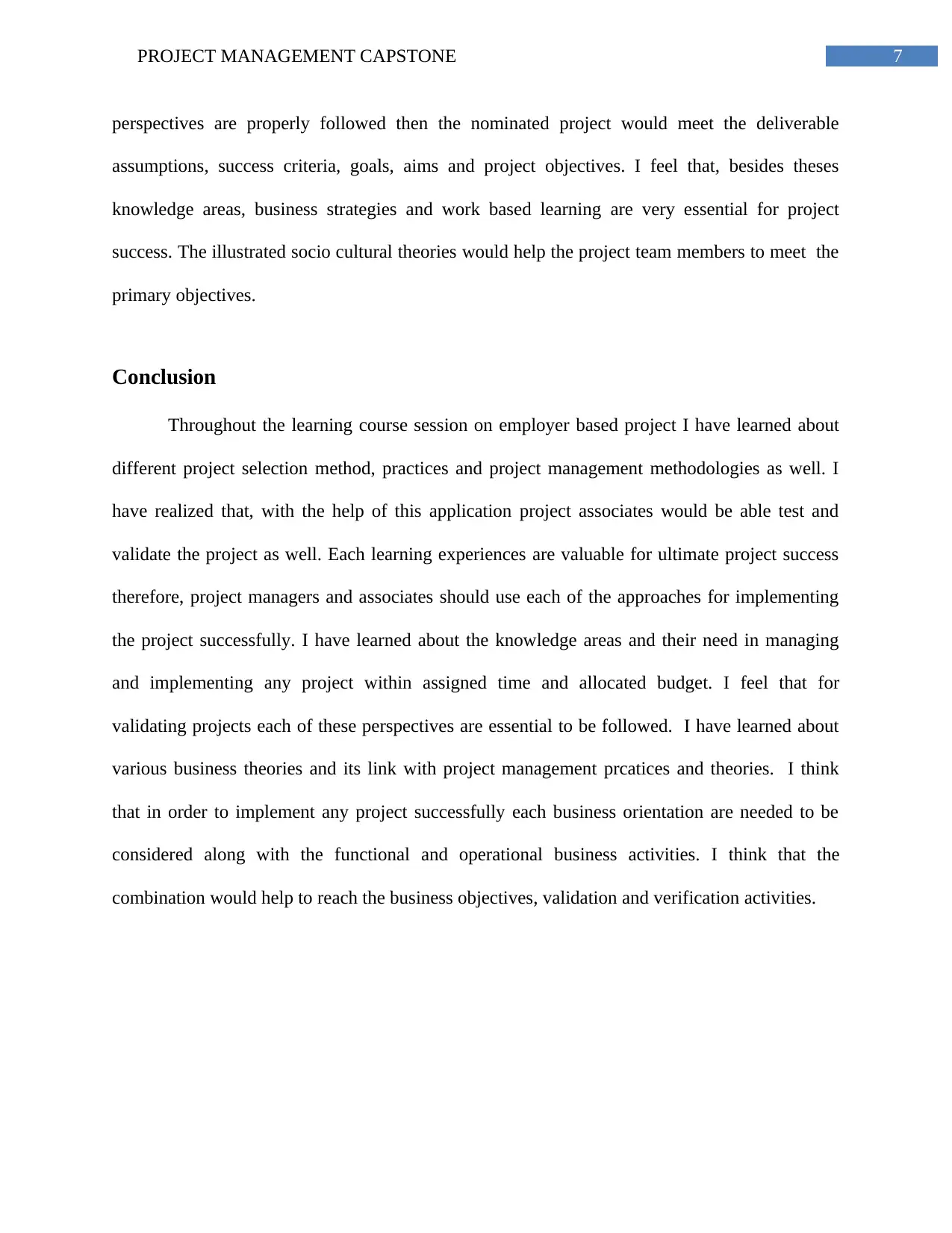
7PROJECT MANAGEMENT CAPSTONE
perspectives are properly followed then the nominated project would meet the deliverable
assumptions, success criteria, goals, aims and project objectives. I feel that, besides theses
knowledge areas, business strategies and work based learning are very essential for project
success. The illustrated socio cultural theories would help the project team members to meet the
primary objectives.
Conclusion
Throughout the learning course session on employer based project I have learned about
different project selection method, practices and project management methodologies as well. I
have realized that, with the help of this application project associates would be able test and
validate the project as well. Each learning experiences are valuable for ultimate project success
therefore, project managers and associates should use each of the approaches for implementing
the project successfully. I have learned about the knowledge areas and their need in managing
and implementing any project within assigned time and allocated budget. I feel that for
validating projects each of these perspectives are essential to be followed. I have learned about
various business theories and its link with project management prcatices and theories. I think
that in order to implement any project successfully each business orientation are needed to be
considered along with the functional and operational business activities. I think that the
combination would help to reach the business objectives, validation and verification activities.
perspectives are properly followed then the nominated project would meet the deliverable
assumptions, success criteria, goals, aims and project objectives. I feel that, besides theses
knowledge areas, business strategies and work based learning are very essential for project
success. The illustrated socio cultural theories would help the project team members to meet the
primary objectives.
Conclusion
Throughout the learning course session on employer based project I have learned about
different project selection method, practices and project management methodologies as well. I
have realized that, with the help of this application project associates would be able test and
validate the project as well. Each learning experiences are valuable for ultimate project success
therefore, project managers and associates should use each of the approaches for implementing
the project successfully. I have learned about the knowledge areas and their need in managing
and implementing any project within assigned time and allocated budget. I feel that for
validating projects each of these perspectives are essential to be followed. I have learned about
various business theories and its link with project management prcatices and theories. I think
that in order to implement any project successfully each business orientation are needed to be
considered along with the functional and operational business activities. I think that the
combination would help to reach the business objectives, validation and verification activities.
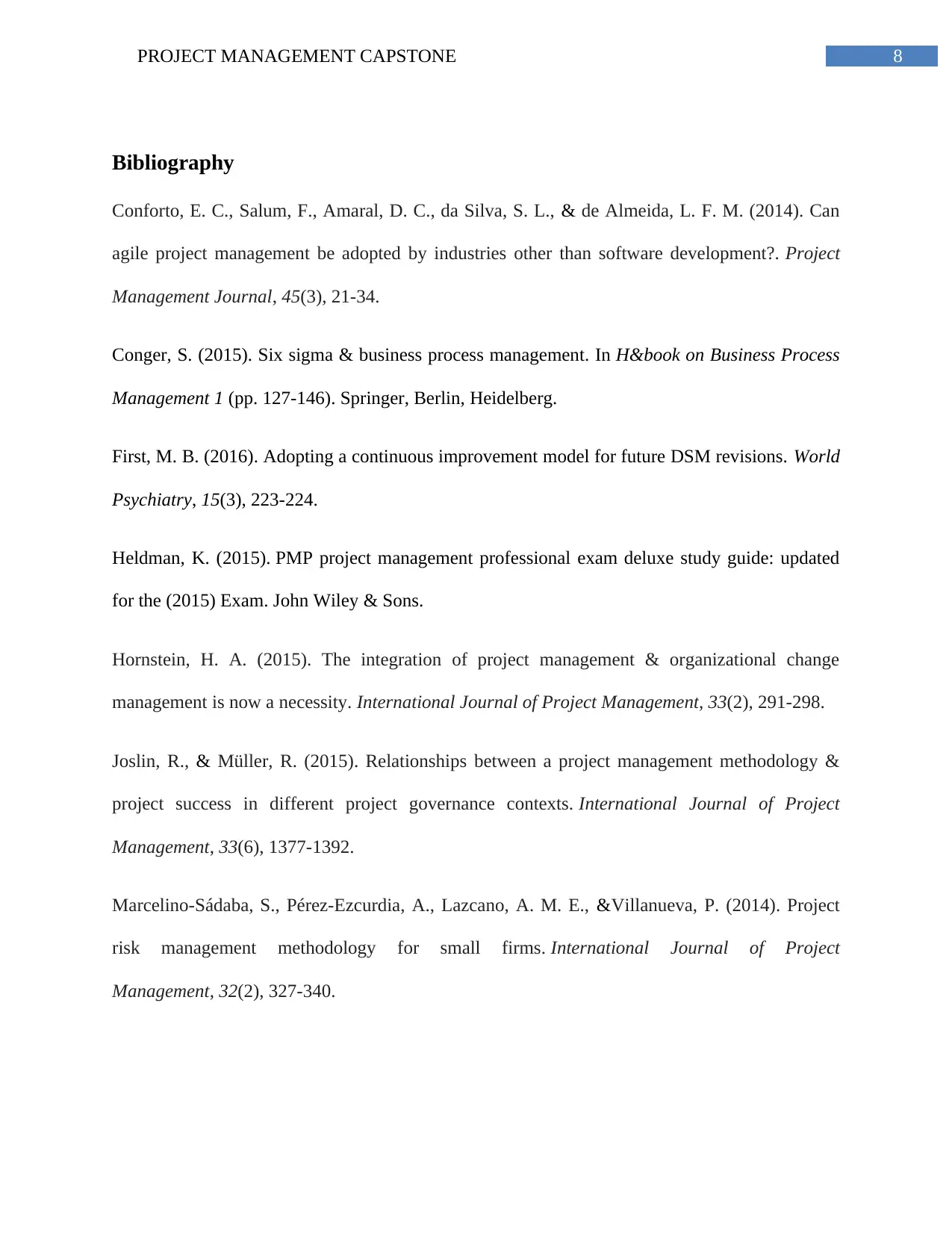
8PROJECT MANAGEMENT CAPSTONE
Bibliography
Conforto, E. C., Salum, F., Amaral, D. C., da Silva, S. L., & de Almeida, L. F. M. (2014). Can
agile project management be adopted by industries other than software development?. Project
Management Journal, 45(3), 21-34.
Conger, S. (2015). Six sigma & business process management. In H&book on Business Process
Management 1 (pp. 127-146). Springer, Berlin, Heidelberg.
First, M. B. (2016). Adopting a continuous improvement model for future DSM revisions. World
Psychiatry, 15(3), 223-224.
Heldman, K. (2015). PMP project management professional exam deluxe study guide: updated
for the (2015) Exam. John Wiley & Sons.
Hornstein, H. A. (2015). The integration of project management & organizational change
management is now a necessity. International Journal of Project Management, 33(2), 291-298.
Joslin, R., & Müller, R. (2015). Relationships between a project management methodology &
project success in different project governance contexts. International Journal of Project
Management, 33(6), 1377-1392.
Marcelino-Sádaba, S., Pérez-Ezcurdia, A., Lazcano, A. M. E., &Villanueva, P. (2014). Project
risk management methodology for small firms. International Journal of Project
Management, 32(2), 327-340.
Bibliography
Conforto, E. C., Salum, F., Amaral, D. C., da Silva, S. L., & de Almeida, L. F. M. (2014). Can
agile project management be adopted by industries other than software development?. Project
Management Journal, 45(3), 21-34.
Conger, S. (2015). Six sigma & business process management. In H&book on Business Process
Management 1 (pp. 127-146). Springer, Berlin, Heidelberg.
First, M. B. (2016). Adopting a continuous improvement model for future DSM revisions. World
Psychiatry, 15(3), 223-224.
Heldman, K. (2015). PMP project management professional exam deluxe study guide: updated
for the (2015) Exam. John Wiley & Sons.
Hornstein, H. A. (2015). The integration of project management & organizational change
management is now a necessity. International Journal of Project Management, 33(2), 291-298.
Joslin, R., & Müller, R. (2015). Relationships between a project management methodology &
project success in different project governance contexts. International Journal of Project
Management, 33(6), 1377-1392.
Marcelino-Sádaba, S., Pérez-Ezcurdia, A., Lazcano, A. M. E., &Villanueva, P. (2014). Project
risk management methodology for small firms. International Journal of Project
Management, 32(2), 327-340.
⊘ This is a preview!⊘
Do you want full access?
Subscribe today to unlock all pages.

Trusted by 1+ million students worldwide
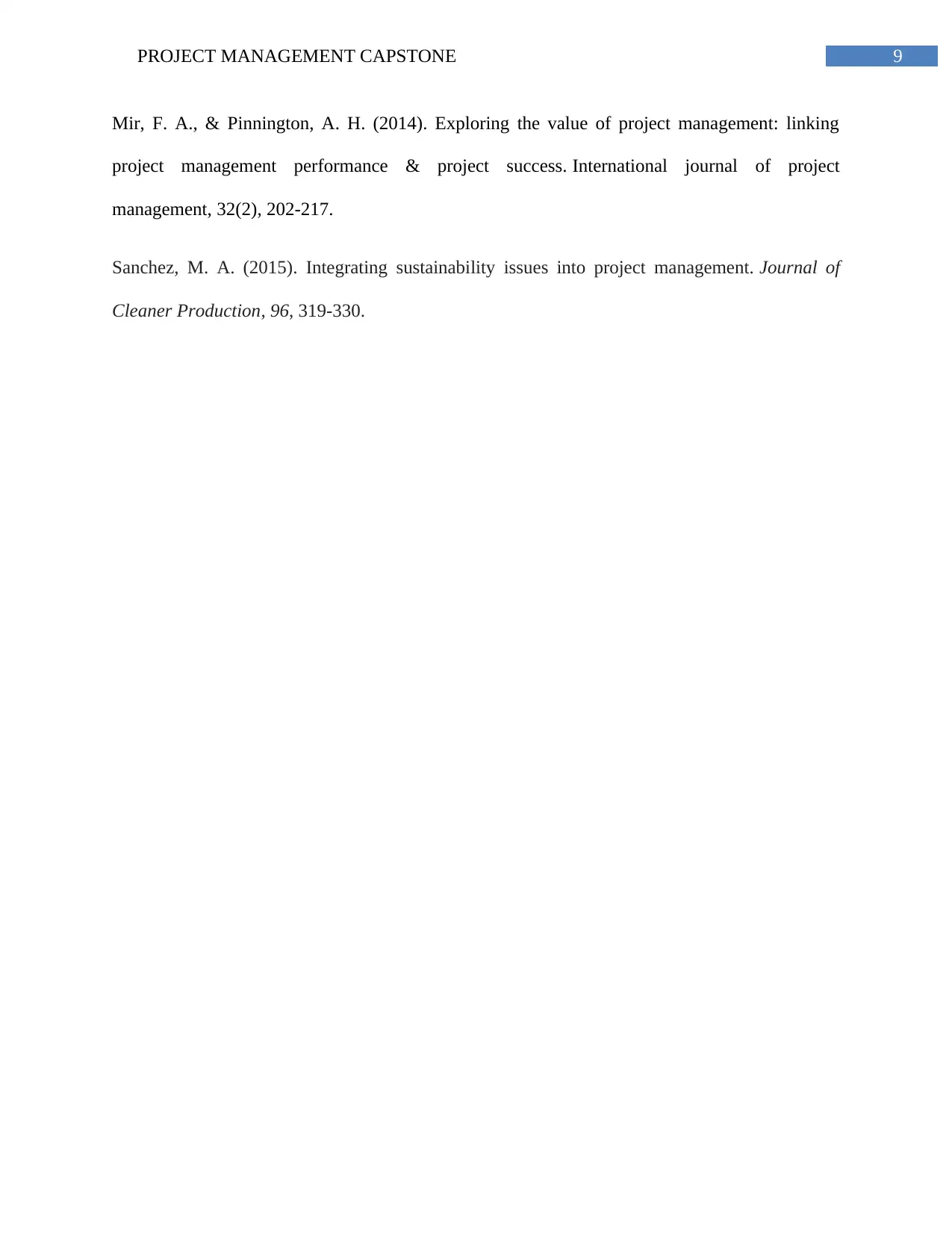
9PROJECT MANAGEMENT CAPSTONE
Mir, F. A., & Pinnington, A. H. (2014). Exploring the value of project management: linking
project management performance & project success. International journal of project
management, 32(2), 202-217.
Sanchez, M. A. (2015). Integrating sustainability issues into project management. Journal of
Cleaner Production, 96, 319-330.
Mir, F. A., & Pinnington, A. H. (2014). Exploring the value of project management: linking
project management performance & project success. International journal of project
management, 32(2), 202-217.
Sanchez, M. A. (2015). Integrating sustainability issues into project management. Journal of
Cleaner Production, 96, 319-330.
1 out of 10
Related Documents
Your All-in-One AI-Powered Toolkit for Academic Success.
+13062052269
info@desklib.com
Available 24*7 on WhatsApp / Email
![[object Object]](/_next/static/media/star-bottom.7253800d.svg)
Unlock your academic potential
Copyright © 2020–2026 A2Z Services. All Rights Reserved. Developed and managed by ZUCOL.



